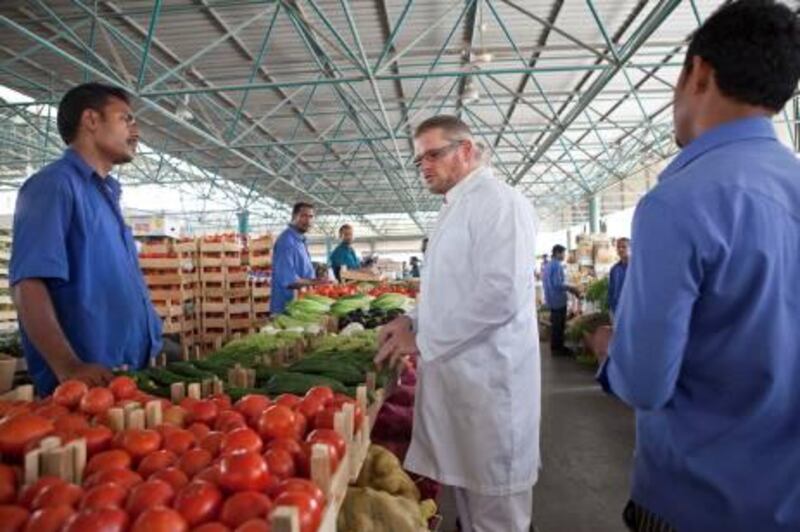DUBAI //Produce sits in neat rows in the shade at the main fruit and vegetable market in Ras al Khor, and Sven Mostegl is well pleased.
"Vegetables are being handled correctly and the temperature is fine," says Mr Mostegl, a food consultant.
MORE UAE NEWS: Our pick of today's top local news stories
Restaurants to face stricter food inspections for Ramadan Food Control Department will focus on high risk offences such as temperature control and general cleanliness of premises and staff. Read article
Visa firms targeted over beggars Police are taking aim at travel companies that issue visit and tourist visas to beggars. Read article
Desert survival: please do not touch the scorpions The biggest risk to health in the desert comes not from snakes or scorpions but ants, the bite of which can cause severe allergic reactions. Read article
[ MORE UAE NEWS ]
The few vegetables that have been cut to show their quality are covered with plastic film and none of the produce is in direct sunlight.
Mr Mostegl's thermometer shows 36.7°C in the shade and 42°C in the sun.
"The sun's ultraviolet lights affect fruits and vegetables and make them prone to contamination," he says. "But they have made sure to keep all food outside any rays of the sun to avoid bacteria."
It is a far cry from the market in the past.
"Five years ago, the market wasn't like this," says Mr Mostegl. "It looked totally different. It's much cleaner now. There are no vegetables on the floor and there are even fans inside."
The municipality has been scrutinising the market, which it owns.
"We have our hygiene inspectors working there every day to monitor the display, the quality and the cleanliness of the food," says Sultan Tahir, the acting head of animal product control at the municipality.
Inspectors work in shifts, covering the whole day apart from a couple of hours overnight when the market is silent, Mr Tahir says.
"People know we are closely watching them and it's so important to maintain a high level of hygiene because this is the source of everyone's food," he says.
"We have nothing to hide and by the end of the day, we destroy all unwanted items to ensure we maintain that high level of good hygiene."
The only breach Mr Mostegl notices is a cigarette butt on the ground. But he compares the market's standards favourably with those in Europe.
"The flooring is clean, it's organised and there are barely any spoilt fruits and vegetables, he says, adding it is "the best market in the UAE, from what I've seen".
Some onions and garlic are stored in direct sunlight but they have a natural antiseptic that automatically kills bacteria. "They need a very long time to spoil," Mr Mostegl says.
And a bunch of cabbages sit on a metal frame, propped against one of the market's main support poles, but he is content. "They are meant to be peeled and sanitised so this is not a problem," Mr Mostegl says. "This is a very nice market, to be honest."
Bashir Yousif, a food safety expert at the municipality, says Dubai has a long history of stringent food controls.
"The UAE depends a lot on trade so we must be up to the standards," Mr Yousif says. "Markets are regarded as tourist attractions in many countries."
Elsewhere, he says, food safety starts at the farm. But with 80 per cent of its food imported, in the UAE it starts at the port.
"Our control also starts at this market, where temperature control and cleaning are both very important," Mr Yousif says.






